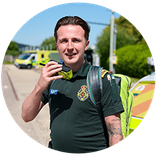Tom's Journey - Advanced Paramedic

Tom Olley is an advanced paramedic who has been with the Trust for five years.
For as long as I can remember I wanted to be in the ambulance service. While studying for my A-Levels, I started volunteering as a community first responder (CFR) with the East of England Ambulance Service (EEAST).
I have always wanted to care for people at their time of need, and that was the start of my journey. I worked as an emergency call handler, which I thoroughly enjoyed, in between finishing my A-Levels and prior to beginning my degree in Paramedic Science at the University of Suffolk. Working in the emergency operations centre was a fantastic opportunity to gain exposure into a vital part of the ambulance service. I would recommend being a call handler to anyone interested in working for EEAST. Not all roles are patient facing but they can still enable you to make an incredible difference in the patient’s journey!
I qualified as a paramedic in 2019 and immediately began my career as a newly qualified paramedic (NQP), working on both frontline ambulances and rapid response vehicles (RRV). After I finished my NQP period, I progressed to a senior paramedic and practice educator position, which involved mentoring undergraduate students. Next I began working in a developing role as a hospital ambulance liaison officer (HALO). This role predominately involved overseeing the efficient handover of a patient from an ambulance into one of the regions A&E departments. The HALO role was established to support and focus on the welfare of staff and patients, especially at times of ambulances being unable to offload. I am incredibly interested in leadership, and working as a HALO supported me in my development as a leader. I found the role both rewarding and challenging, as rather than caring for one patient, suddenly multiple ambulance crews and patients are your responsibility, and that can be a challenge.
Following this, I trained with the special operations response team (SORT) which is a national resilience team that can provide life-saving care in mass casualty incidents, such as marauding terror attacks. The national team alongside the hazardous area response team (HART) was established after the 2005 London bombings, to provide the best care in the event of a multi casualty incident. I have always been fascinated in the multi-agency response to an incident, and how everyone works together with the mutual focus of saving lives.
In 2021, I began my full-time work on an RRV while studying towards a master’s degree in advanced clinical practice with the University of East Anglia and in early 2023 I transferred over to the new urgent care directorate as a specialist paramedic in urgent care. I have since completed my postgraduate MSc degree enabling me to practice as an advanced paramedic in urgent care. I am now nearing the end of my non-medical prescribing qualification with the University of Nottingham which will qualify me to work as advanced clinical practitioner in urgent care.
My current role as an advanced paramedic in urgent care is innovative and exciting. I work as an autonomous solo responder on an admission avoidance vehicle, where I am tasked to patients with minor illness or minor injury that may not need an ambulance or to be taken to hospital and may be more suited to being treated at home or refereed to services available in the community. It’s rewarding that I’m able to manage the care of most of my patients in their own home, ultimately leaving the emergency ambulances free to respond to our sickest patients.
The journey I have taken to get to where I am today is a demonstration of focus, hard work and commitment and certainly didn’t come easy. My experience with EEAST has been incredible, with many opportunities of self-progression along the way. If you are considering a career in the ambulance service, I would absolutely encourage you to take the leap. EEAST has a culture of support and development and I hope my journey and story has shown that with focus and commitment, you can develop and work into some fantastic roles to help provide the best care for the people that need us most. During my time here, I have seen many changes during and post pandemic, and I am deeply proud to be part of the team EEAST.
